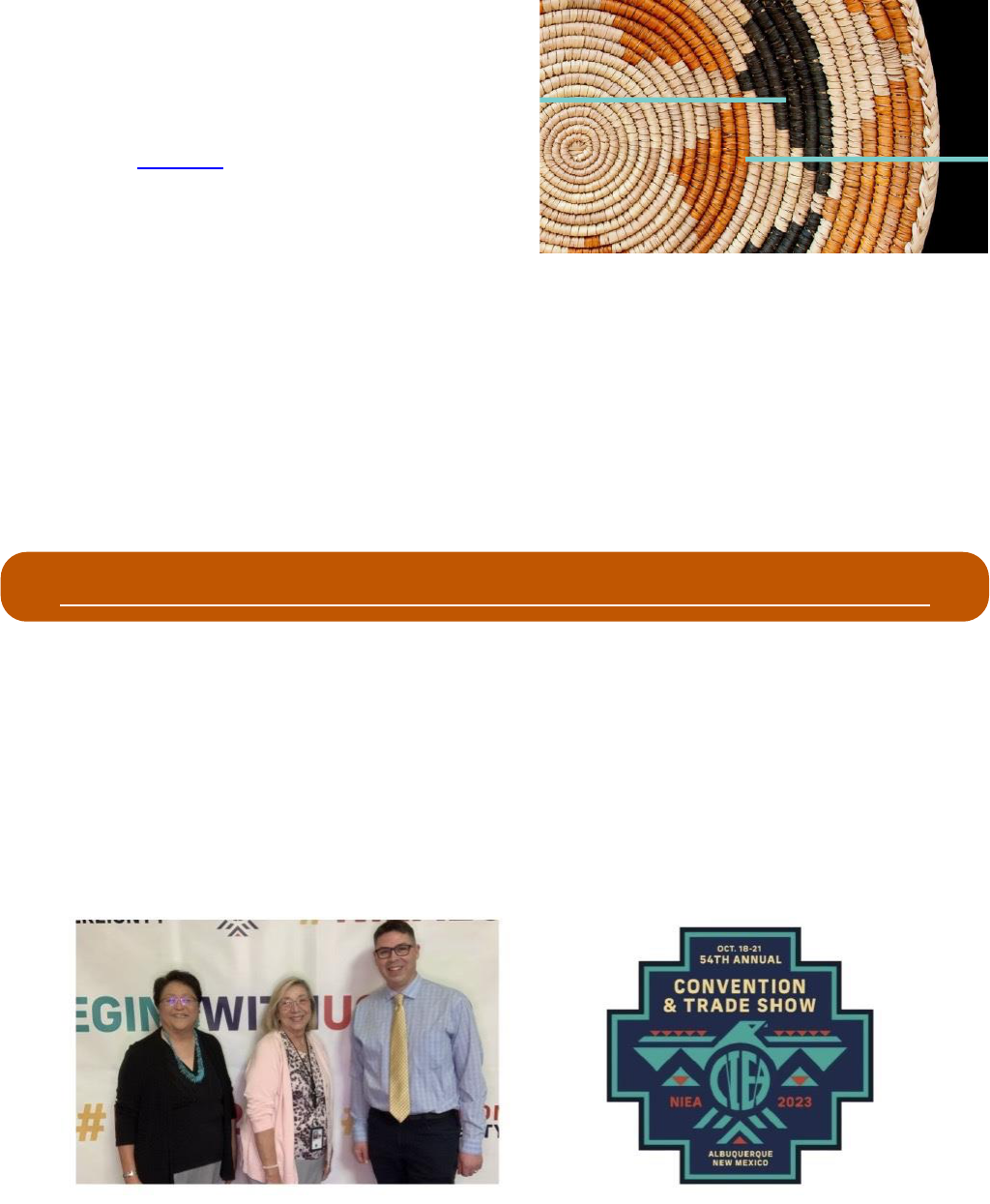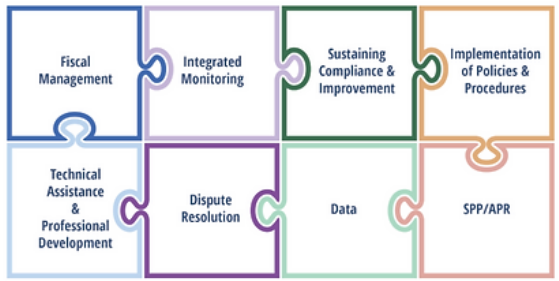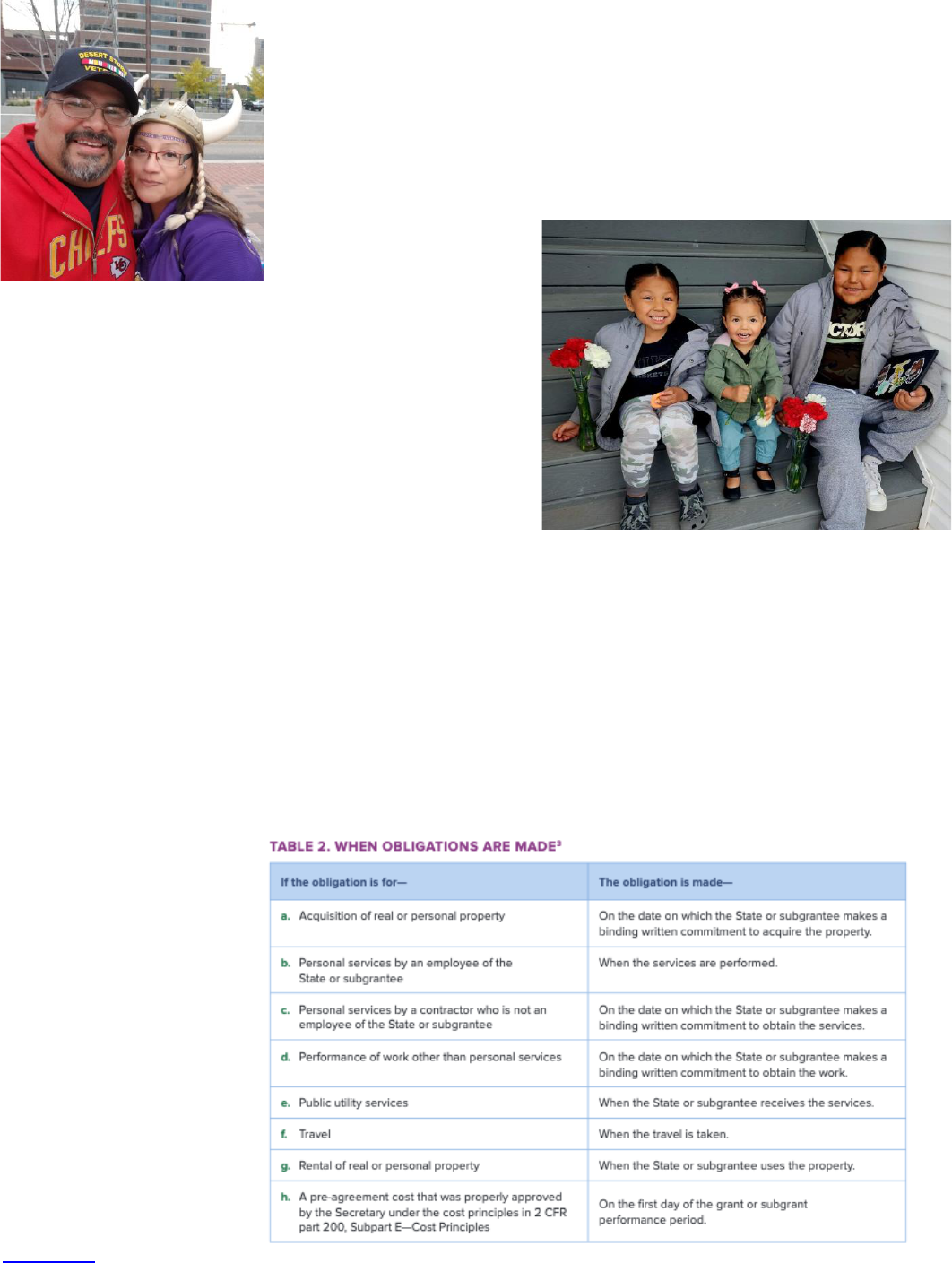
The Monthly
Newsletter
Featured Article:
BIE’s Advisory Board for Exceptional Children
Special Education Director’s Welcome Message
Welcome to the BIE-DPA Special Education Program
Monthly Newsletter!
November is National Native American Heritage Month.
BIE-DPA joins the Department of Interior in recognizing
this month and it’s theme Celebrating Tribal Sovereignty
and Identity. More information is available at this
webpage: https://www.bia.gov/NNAHM.
We share gratitude with you, our school communities,
who include students and their families traditions,
languages, food, Tribal attire, clans and kinship, and
stories of Native American, Alaska Native, Native
Hawaiian and affiliated Island communities into your
lessons daily. Please join in acknowledging one another
and your school’s educators as we celebrate Tribal
Sovereignty and identity.
Dr. Eugene Thompson (Diné), Supervisory Education
Specialist
Table of contents
Welcome
Featured article
News and updates
Upcoming Events
Spotlight
Tips and Tricks
Important Dates
NOVEMBER 2023
Vol. 02
Bureau of Indian Education-Division of Performance & Accountability
Special Education Program Monthly Newsletter

The purpose of the BIE’s Advisory Board for Exceptional Children is to improve special
education and related services for children with disabilities within the BIE school system
and to assist the Secretary of the Interior in
performing their duties under the IDEA by
advising on the needs of Indian children with
disabilities. The Board’s annual report can be
accessed at this site. Each Advisory Board
meeting includes a specific portion of time for
public comment. Consider making a public
comment during the next Advisory Board
meeting scheduled for January 18-19, 2024.
Jennifer Davis serves as the Federal Designated Officer (DFO) supporting the board
members. The DFO approves or calls all Board and subcommittee meetings; prepares or
approves all meeting agendas; attends all Board and subcommittee meetings; adjourns any
meeting when the DFO determines adjournment to be in the public interest; and chairs
meeting when directed to do so by the Assistant Secretary-Indian Affairs.
We’d like to include celebrations, updates, and success stories from BIE-funded schools.
Take some time to consider highlighting a story or photos, with permission, from your
school that can be included in an upcoming newsletter. Click the orange button above and
a member of the team will be in touch with you.
News & Updates:
From the Division of Performance & Accountability (DPA)
The DPA-IDEA Team participated (see picture above L to R: Jennifer Davis, Part B Data
Manager; Margo DeLaune, Associate Deputy Director, DPA; and Ronald Worst, Education
Specialist) in the 2023 National Indian Education Association (NIEA) convention held in
Submit a School Story for an Upcoming Newsletter Spotlight
BIE ADVISORY BOARD FOR
EXCEPTIONAL CHILDREN

Albuquerque last month. DPA IDEA staff and members of the BIE’s Advisory Board for
Exceptional Children offered a poster session to disseminate information on BIE’s Advisory
Board for Exceptional Children. Topics included highlights of the Board’s work, its
membership and upcoming vacancies. The Advisory Board provides guidance and advice to
the BIE on special education matters. Board members include parents of students with
disabilities, individuals with disabilities, school officials, educators and related service
providers.
BIE’s General Supervision Responsibility
BIE like all state education agencies must have a system of general supervision in place to
monitor the implementation of IDEA. The BIE’s General Supervision System is designed to
support practices that improve educational results and functional outcomes for children
with disabilities; to use multiple methods to identify and correct noncompliance; and to use
a variety of mechanisms to encourage and support improvement; and to enforce
compliance.
BIE’s General Supervision System
consists of eight components related to
the implementation of IDEA; the
components inform one another as well
as the system as a whole. The
components are as follows:
1. Data
2. Dispute Resolution
3. Fiscal Management
4. Implementation of Policies & Procedures
5. Integrated Monitoring Activities
6. State Performance Plan/Annual Performance Report (SPP/APR)
7. Sustaining Compliance & Improvement
8. Technical Assistance and Professional Development
Getting to Know Members of the DPA IDEA Team

Hello I am Melanie Star, a Dakota, my Indian name is
Wacinyanpi Win (Reliable woman) passed down from my Mom,
Sharlene Iron Road. I grew up in Mandan, ND and I’m an
enrolled member of the Standing Rock Sioux Tribe of North and
South Dakota. I married my best friend, Woodrow Star III who is
the biggest Kansas City Chiefs fan while I am Vikings fan, SKOL!
I have one son, Troy Jr.
& my daughter-in-law,
Sunshine, who is the best Mom to our three little
blessings my grandchildren, Troy III, Storm, and
Mila (see picture on the right). I have my Master’s
in education focusing on Special education. I was a
classroom teacher (FACE program, Kindergarten,
5
th
, K-5 Special education, and gifted & talented
Coordinator) for 25 years before I started with BIE.
I enjoy working with my co-workers and the work I
do for our Native schools throughout the country. My favorite part is being able to meet
our educators from our schools in person and hearing the amazing things they are doing for
our Native students.
A Reminder on IDEA Funds
From federally funded technical assistance centers, we share this recently developed Quick
Reference Guide on Timely Expenditure of IDEA Funds (National Center for Systemic
Improvement, Center for IDEA Fiscal Reporting, Center for IDEA Early Childhood Data
Systems, and Early
Childhood Technical
Assistance Center,
2023). In this brief, we
are reminded when
obligations are made.
Take a few minutes to
review the information
below about when
IDEA funds are
considered obligated
and for the full
resource go to this
webpage.

The DPA IDEA Team provides a number of supports to all BIE-funded schools. The IDEA
Education Program Specialists provide technical assistance to their assigned schools and are
available to customize support to meet your school team’s needs. Check out the BIE’s
special education staff by accessing this webpage: https://www.bie.edu/landing-
page/special-education.
Upcoming Events
NASIS Special Education Training on IEP Changes
October 31-November 2, 2023; November 14-16, 2023
Join Infinite Campus and BIE NASIS staff to learn about changes that recently went into
effect to support IEP team’s development and revision to IEPs.
Supplemental Education Programs (SEP) – November's SEP webinar calendar
Recorded Events
Click the hyperlinks below to access the recordings.
Data Collections
• Indicator 11 – Initial Evaluation Data Collection; Passcode: Ua6N9*cH
NASIS Micro Training Series
• Session 1 – Secondary Transition Components; Passcode: +s6iAmpN
• Session 2 – Secondary Transition Components Continued; Passcode: $s*QCW9X
• Session 3 – NASIS Module IEP Editors; Passcode: *205YAKq
• Session 4 – New Look IEP module changes; Passcode: @zOb4sw&
• Session 5 – NASIS Infinite Campus IEP review Micro Training; Passcode: 01tSbwY%
• Session 6 – IEP Module Team Meeting Participants Page; Passcode: C4bK8m.h
• Session 7 – IEP Module Problem Solving; Passcode: +!I^V8HQ
• Session 8 – IEP Module Open Discussion; Passcode: !bc2*2L&

Spotlight
Tribal Consultation
The BIE is responsible for ensuring that its
implementation of Part B of the Individuals with
Disabilities Education Act (IDEA) is consistent with
federal law. BIE is proposing to update its IDEA
policies and procedures that apply to BIE-funded
schools.
Tribal Consultation was held on October 13 virtually
and in person on October 18 and October 25. More
information including the draft policies are
available at: https://www.bie.edu/landing-page/consultations-initiatives. Consider
providing a written comment before the November 13 deadline. Written comments are
accepted by emailing consulta[email protected] or US postal mail to Juanita Mendoza, 1849
C Street, NW, MS 3609 Washington, D.C. 20240.
Tips and Tricks
Coordinated Early Intervening Services (CEIS)
CEIS are services provided to students in kindergarten through grade 12 (with a
particular emphasis on students in kindergarten through grade three) who are not
currently identified as needing special education or related services, but who need
additional academic and behavioral supports to succeed in a general education
environment. CEIS activities include: (1) professional development for teachers and
other school staff to enable such personnel to deliver scientifically based academic and
behavioral interventions, including scientifically based literacy instruction, and, where
appropriate, instruction on the use of adaptive and instructional software; and (2)
providing educational and behavioral evaluations, services, and supports, including
scientifically based literacy instruction.
Annually, the BIE submits CEIS lag data (prior year’s data) in May to the U.S. Department
of Education. In May 2023, the BIE reported SY2021-2022 CEIS data. There were 23 BIE
funded schools who implemented CEIS, serving 1,174 general education students, with
51 of those students becoming eligible for special education services. A total of
$1,216,430 of Part B funds were used to support CEIS activities. In May of 2024, SY2022-
2023 CEIS data will be reported for 23 BIE funded schools who requested to use Part B
funds for CEIS activities.

The option to implement CEIS is voluntary for all BIE-funded schools. Consider applying
for SY 2024-2025 (up to 15% of Part B IDEA funds), when the Part B IDEA application is
open for submission.
Local School Performance Plan
In Native Star, all BIE-funded schools with special education programs submit a Local
School Performance Plan (LSPP) which includes Improvement Activities. the
improvement activities should demonstrate efforts to continually make improvements.
The documentation should include how the activities for selected SPP/APR indicators will
lead to positive outcomes for students with IEPs. The first progress checkpoint is due
December 30, 2023 with a second and final progress checkpoint due March 30, 2024.
LRP
BIE-DPA provides free access to LRP publications for all BIE-funded schools. Consider
registering today for 1-hour, self-paced courses available. All staff including teachers,
administrators, paraprofessionals, education technicians and food service can self-register
by going to: https://dc-bie2020-ds.lrp.com. Customized training is also available to all BIE-
funded schools at request by reaching out to Jennifer Davis.
The DirectSTEP eCourses are one
option available at no charge for
BIE-funded schools. This course
explains best practices and the
legal requirements for behavior
management, autism, IDEA
eligibility, IEPs and more. These
courses also teach educators
how to handle critical education
issues to obtain positive
outcomes while applying education laws to the day-to-day world of teaching and
learning. If your staff need assistance, contact LRP training staff toll-free at 1-800-515-
4577 ext 6515 or via email at directstep@lrp.com.
NASIS
The Bureau of Indian Education (BIE), in partnership with Infinite Campus, collaborates
on the Native American Student Information System (NASIS). NASIS is a centralized
system for supporting school administrators, teacher, staff, students, parents/guardians,
and Central Office staff. NASIS contacts are included below for your reference.

Name & Title
Contact
Assignments
Rebecca Izzo-Manymules
Supervisory Education Specialist
Chief Academic Office
Cole Bowers
NASIS Specialist
703.282.5646 (Mobile)
Tribally Controlled Schools ADD:
• Bismarck ERC Schools
• Kyle ERC Schools
• Nashville ERC Schools
Valerie Jones
NASIS Specialist
703.340.7417 (Mobile)
Navajo ADD:
• Chinle ERC Schools
• Crownpoint ERC Schools
• Window Rock ERC Schools
• Albuquerque ERC Schools
Susan McCabe
NASIS Specialist
703.282.2043 (Mobile)
Bureau Operated Schools ADD:
• Belcourt ERC Schools
• Phoenix ERC Schools
• Tuba City ERC Schools
• Chinle ERC School (Chilchinbeto)
• Albuquerque ERC Schools
Sandra Poolaw
NASIS Specialist
Sandra.pool[email protected]
703.282.1936 (Mobile)
• Seattle ERC School (Lummi HS)
• Shiprock ERC School (Navajo Preparatory
School)
• Flandreau ERC School (Sequoyah HS)
Katherine Renville
NASIS Specialist
Tribally Controlled Schools ADD:
• Minneapolis ERC Schools
• Flandreau ERC Schools
• Albuquerque ERC Schools
• Pine Ridge ERC Schools
Cheryl Rodriguez
NASIS Specialist
Tribally Controlled Schools ADD:
• Seattle ERC School (Lummi HS)
• Shiprock ERC Schools
• Albuquerque ERC Schools
Supporting Secondary Transition
Did you know that DPA IDEA utilizes an 8-component checklist created by an OSEP-funded
technical assistance center to assess secondary transition compliance annually for all BIE-
funded high schools? The components are as follows:
1. Are there appropriate postsecondary goals that cover education or training,
employment, and, as needed, independent living?
2. Are the postsecondary goals updated annually?
3. Is there evidence that the measurable postsecondary goals were based on an age-
appropriate transition assessment?

4. Are there transition services in the IEP that will reasonably enable the student to
meet their post-secondary goals?
5. Do the transition services include courses of student that will reasonably enable the
student to meet their postsecondary goals?
6. Are there annual IEP goals related to the student’s transition services needs?
7. Is there evidence the student was invited to the IEP meeting where transition
services were discussed?
8. If appropriate, is there evidence that a representative of any participating agency
was invited to the IEP meeting with the prior consent of the parent or student who
has reached the age of majority?
Unmet Needs
Reminder applications for Unmet Needs are due via email to Laura Tsosie by November 17.
Unmet Needs applications are available for schools who special education funds (15% ISEP
Academic Base Funds, IDEA Part B Carry-over from previous year, and Current IDEA Part B
allocation) are insufficient to cover the needs of student with disabilities. Unmet Needs are
also available to schools whose enrollment of students with disabilities increases
significantly after the October 28, 2022 Child Count due to transfer and new placements in
special education.
Wellness Wednesdays
Wellness Wednesdays are optional, drop-in webinars that will teach you about a range of
topics related to wellness and self-care. Active participation is encouraged, and we will
feature new presentations and activities each month.
Important Upcoming Due Dates
What
When
Where
For support
or questions,
reach out to
Unmet
Needs
November
17, 2023
Application due to Laura Tsosie.
Your assigned
DPA Education
Specialist
Initial
Evaluations
November
30, 2023
All initial evaluations completed during
SY 2022-2023 due via Smartsheet form.
Your assigned
DPA Education
Specialist

What
When
Where
For support
or questions,
reach out to
Local School
Performance
Plan
December
30, 2023
First Progress Checkpoint due in Native
Star.
Your assigned
DPA Education
Specialist
